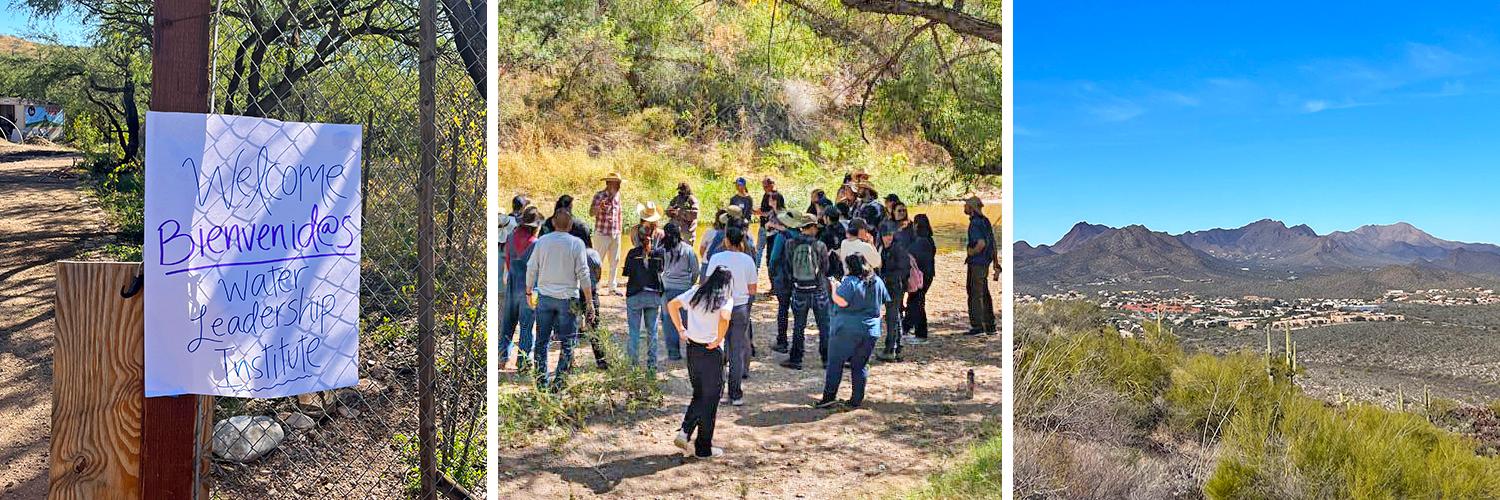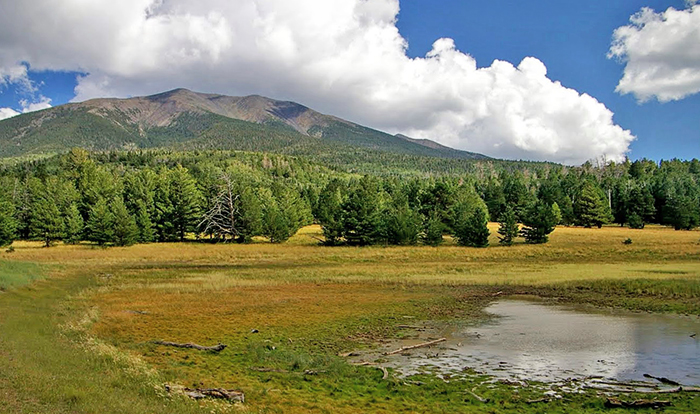
Arizona’s emerging water leaders: Looking toward the future
I have spent the last two years as the community engagement specialist for Arizona Water for All, a pillar of the Arizona Water Innovation Initiative. As I prepare to attend graduate school in the fall, I find myself reflecting on the success of the Water Leadership Institute that we developed and the honor of learning from a vibrant network of collaborators living across the most biodiverse desert in the world.
The opportunity to co-create the Water Leadership Institute (WLI) in southern Arizona, alongside community partners including the Environmental Defense Fund, Water for People and Reconciliacion en el Rio Santa Cruz, has not only shaped my own capacity for leadership but, more importantly, illustrated the necessity of community-informed programs that can create networks of resilient water stewardship in a changing climate.
A new Arizona Water Leadership Institute
The Water Leadership Institute (WLI) was initially developed out of a cross-organizational landscape analysis and years of conversation with community members that indicated a greater need for pathways to leadership in both traditional and nontraditional water spaces for often marginalized people.
In 2024, we had the privilege of creating the WLI and bringing together 50 passionate, emerging leaders from across southern Arizona for a program that explored water challenges like groundwater depletion, transboundary water quality, drought and seasonal flooding.
We met on the ancestral homelands of the O’odham and Yaqui people and heard about restoring Indigenous leadership, explored transnational case-studies and held conversations around how we can develop community-driven solutions to complex water issues in the borderlands.

Over the course of four sessions, participants heard from over 20 guest speakers, including nonprofit specialists, scientists, activists, policymakers and Indigenous leaders each sharing their expertise and lessons learned from working on the frontlines of water challenges.
Each session was crafted as an opportunity for dialogue and exploration, and I will always remember the conversations that ignited in these rooms with people who were vulnerable and open enough to share their experiences of living, working and growing in the Sonoran desert.
For example, Jaynee Monarrez grew up in Ambos Nogales and shared how the WLI experience shaped her outlook on both water and leadership.
“Ten years ago at Nogales High, I dreamed of opportunities like this. I always wondered why our community wasn’t talking about environmental issues," said Monarrez. "Hearing from people like Claudia Gil Anaya and Joaquin Marruffo about how water knows no borders and requires transboundary collaboration was eye-opening."
"We saw hope in places like SEEDS Farm, where young people are reconnecting to land and cultural practices to rebuild community. When we drift too far from the earth, our inner nature calls us back," Monarrez continued. "This is why we see so many young people now becoming involved in stewardship. We crave that connection, not only to our land, but to each other as well. The WLI helped me feel less alone and more equipped to lead water conversations in my community.”
Monarrez reminds me that leadership isn’t one-size-fits-all. It takes many forms and requires a deep commitment to reconnecting with the earth and elevating the voices of the most-impacted by water-insecurity and climate crisis. The WLI was designed to honor these voices, bridging generational and geographical divides and driven by the shared goal of working toward sustainable, equitable water access.
Expanding the Water Leadership Institute to Northern Arizona
When I look beyond 2025, I’m filled with optimism about Arizona Water for All’s next steps as we plan to host a second cohort in southern Arizona this fall and have begun early conversations to co-develop a WLI program in Northern Arizona with our partners at Northern Arizona University (NAU), Environmental Defense Fund and Water for People.
Northern Arizona sits on the Colorado Plateau and is home to diverse cultural perspectives and unique environmental challenges. As we build each iteration of the WLI, we are committed to listening, learning and creating alongside local communities to cultivate a program that reflects their specific needs and hopes for water resilience in their region.

Lucero Radonic is the lead of the Arizona Water for All Network node at NAU where she runs the Water, Policy and Society Research Lab. Our partnership with Radonic has been key in facilitating community connections and piloting a cohort in Northern Arizona, and she is excited to get started:
“The WLI is not only about fostering the upcoming generation of water leaders, but creating inter-generational connections and formally acknowledging the rich experiences of water leadership that exist in the Colorado Plateau of Northern Arizona," said Radonic.
"In Arizona we have a history of ground-breaking leadership in water policy and management; however, the pantheon of water leaders has tended to skew towards decision-makers in larger urban centers like Phoenix and Tucson," she continued. "There are many other important water leaders whose contribution to water security should be highlighted as well.”
Looking ahead
Elevating historically overlooked voices is key to building meaningful water programming with lasting effects. Building connected cohorts of emerging water leaders across the state represents an opportunity to extend the relationships we’ve built in southern Arizona and create statewide networks of community members who are working toward an equitable water future.
I’m deeply grateful to each community partner, local leader and participant that have made the WLI convenings possible in southern Arizona. It’s been an honor to learn alongside the passion, dedication and wisdom that lives and thrives in the people across the Sonoran desert and the Colorado Plateau.
I invite my fellow Arizonans to reach out to nonprofit and grassroots leaders, volunteer at a river clean-up day, watch the lightning during a long-awaited monsoon and step outside in one of the many public parks, lakes, rivers and streams across the state to listen for ways to become more involved in the water future they want to create.
About the author: Daniela Sherrill is the community engagement specialist for Arizona Water for All. She received her bachelor’s degree in sustainability with a minor in civic engagement from Northern Arizona University in 2020. Before joining AW4A, she worked in Flagstaff as a program facilitator at an environmental education center and in Tucson as a community organizer for campaigns that raised the minimum wage for workers across the state. She will soon be a graduate student in creative writing at Portland State University.
Related stories: